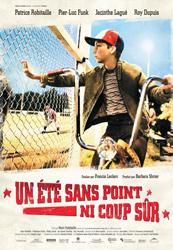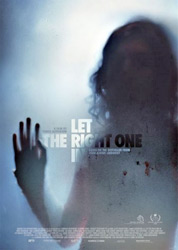|
|
 |
| Inside Québec – August 2008by Maurie Alioff |
|
|
|
|
Boys of SummerThe “jeune fille” of writer-director Francis Leclerc’s 2001 debut feature, Une jeune fille à la fenêtre, dreams of expanding her horizons beyond the constrictions of 1920’s Quebec. When Marthe (Fanny Mallette) hooks up with a band à part fond of jazz, oriental carpets, and wistful yearnings for Paris, she transforms her life, which is threatened by an untreatable heart condition. At the time of the film’s release, Leclerc was proud that Une jeune fille steers clear of rancorous confrontations; the movie never blames anyone, or anything, for its doomed heroine’s sad fate.Leclerc’s Un été sans point ni coup sûr, just released in Quebec and slated for the Toronto International Film Festival’s Contemporary World Cinema line-up, also projects acceptance of life’s setbacks and disappointments. Things don’t always work out the way you want them to, and people are flawed, but nothing is malevolent in this lyrical, nostalgic family picture, adapted by Marc Robitaille’s from his own novel.Produced by the prolific Barbara Shrier, the story follows 12-year-old Martin (Pier-Luc Funk), whose dad Charles (Patrice Robitaille) is a befuddled parent with zero interest in his son’s deep passion for baseball. It’s 1969, the year the Expos set up in Montreal, and Martin finds a surrogate father in the new team’s star outfielder, Mack Jones. Nocturnal fantasies out of Field of Dreams depict Jones (Phillip Jarett) teaching Martin how to accept the sad fact that the burb’s hottest Little League team, the Aristocrates, doesn’t want him. Like Maurice Richard, Quebec’s ultimate sports hero, Jones wears the magical number 9. The times they are a changin’; in the late 1960’s a little Quebec boy’s saviour is an English-speaking black man.If Mack Jones helps Martin score in the game of life, M. Turcotte, the Aristocrates’ coach, almost strikes him out. Roy Dupuis, who took the lead in Leclerc’s award-winning amnesia thriller, Memoires Afffectives (2004), plays Turcotte as a take-off of an absurdly cool star coach. With his jutting jaw, and impeccable cap-windbreaker combos, Turcotte seems to think he’s running a team with a shot at the World Series. “It’s only a game,” Charles yells at the coach, after he finally begins to connect with his son. Leclerc’s movie is so thoroughly suffused with a boy’s need for paternal involvement, some might wonder whether Leclerc’s experiences of his own father – mythic singer-songwriter, and wandering international star Félix Leclerc – attracted him to the material.TIFF’s QuebecLoaded with archival footage and faux home movies, Un été sans point ni coup sûr aims at total immersion in the late 1960’s. Martin’s mother Mireille (Jacinthe Laguë) is hot for The Rolling Stones. The picture references the moon landing, Woodstock, California Dreaming, and of course, Expo ’67. In a scene out of Fellini’s Amaracord, Martin and his friends chill in an abandoned car, singing the theme of Gilligan’s island in French. DP Steve Asselin’s most striking shot pans from astronauts moon walking on a TV set that’s been dragged onto a suburban patio to the moon itself.Un été is not the only return to sixties Quebec that TIFF viewers will see. Léa Pool’s Maman est chez le coiffeur (see May’s Inside Quebec) travels back to 1966, currently hot director work out the way you want them to, and people are flawed, but nothing is malevolent in this lyrical, nostalgic family picture, adapted by Marc Robitaille’s from his own novel.Produced by the prolific Barbara Shrier, the story follows 12-year-old Martin (Pier-Luc Funk), whose dad Charles (Patrice Robitaille) is a befuddled parent with zero interest in his son’s deep passion for baseball. It’s 1969, the year the Expos set up in Montreal, and Martin finds a surrogate father in the new team’s star outfielder, Mack Jones. Nocturnal fantasies out of Field of Dreams depict Jones (Phillip Jarett) teaching Martin how to accept the sad fact that the burb’s hottest Little League team, the Aristocrates, doesn’t want him. Like Maurice Richard, Quebec’s ultimate sports hero, Jones wears the magical number 9. The times they are a changin’; in the late 1960’s a little Quebec boy’s saviour is an English-speaking black man.If Mack Jones helps Martin score in the game of life, M. Turcotte, the Aristocrates’ coach, almost strikes him out. Roy Dupuis, who took the lead in Leclerc’s award-winning amnesia thriller, Memoires Afffectives (2004), plays Turcotte as a take-off of an absurdly cool star coach. With his jutting jaw, and impeccable cap-windbreaker combos, Turcotte seems to think he’s running a team with a shot at the World Series. “It’s only a game,” Charles yells at the coach, after he finally begins to connect with his son. Leclerc’s movie is so thoroughly suffused with a boy’s need for paternal involvement, some might wonder whether Leclerc’s experiences of his own father – mythic singer-songwriter, and wandering international star Félix Leclerc – attracted him to the material.TIFF’s QuebecLoaded with archival footage and faux home movies, Un été sans point ni coup sûr aims at total immersion in the late 1960’s. Martin’s mother Mireille (Jacinthe Laguë) is hot for The Rolling Stones. The picture references the moon landing, Woodstock, California Dreaming, and of course, Expo ’67. In a scene out of Fellini’s Amaracord, Martin and his friends chill in an abandoned car, singing the theme of Gilligan’s island in French. DP Steve Asselin’s most striking shot pans from astronauts moon walking on a TV set that’s been dragged onto a suburban patio to the moon itself.Un été is not the only return to sixties Quebec that TIFF viewers will see. Léa Pool’s Maman est chez le coiffeur (see May’s Inside Quebec) travels back to 1966, currently hot director  Philippe Falardeau`s C’est pas moi, je le jure! evokes 1968, and Luc Bourdon`s doc La mémoire des anges highlights the era with its collaging of Montreal images from 120 NFB films. As past dreams fade to black, and the present tense gets harder to handle, there’s a need to relive happier days – even if they were sad.Scripted by Isabelle Hébert, and screening in Contemporary World Cinema, Pool’s Maman est chez le coiffeur portrays the impact on a family when mom (Céline Bonnier) departs for good. A Special Presentation and world premiere, C’est pas moi, je le jure! also concerns the shock of maternal abandonment, in this case from the point-of-view of a ten-year-old boy. The thematic parallel might be explained by the fact that Falardeau’s movie adapts a novel by Isabelle Hébert’s brother, Bruno.On the other hand, Rodrigue Jean’s Lost Song explores similar emotional territory, portraying a mother, in this case a new parent, who needs to flee from those nearest and dearest. Another world premiere in the Contemporary World Cinema Philippe Falardeau`s C’est pas moi, je le jure! evokes 1968, and Luc Bourdon`s doc La mémoire des anges highlights the era with its collaging of Montreal images from 120 NFB films. As past dreams fade to black, and the present tense gets harder to handle, there’s a need to relive happier days – even if they were sad.Scripted by Isabelle Hébert, and screening in Contemporary World Cinema, Pool’s Maman est chez le coiffeur portrays the impact on a family when mom (Céline Bonnier) departs for good. A Special Presentation and world premiere, C’est pas moi, je le jure! also concerns the shock of maternal abandonment, in this case from the point-of-view of a ten-year-old boy. The thematic parallel might be explained by the fact that Falardeau’s movie adapts a novel by Isabelle Hébert’s brother, Bruno.On the other hand, Rodrigue Jean’s Lost Song explores similar emotional territory, portraying a mother, in this case a new parent, who needs to flee from those nearest and dearest. Another world premiere in the Contemporary World Cinema selection, Lost Song’s Acadian writer-director stirred up controversy with Hommes à louer, his doc about male hustlers. Jean’s previous dramatic features were Full Blast (1999) and the hyper-erotic road movie, Yellowknife (2001). One more world-premiere, Rafaël Ouellet’s Derrière moi will play in TIFF’s Vanguard slot. The movie is billed as an “atmospheric … and sinister study of escape and betrayal.” As for courts-métrages, the Short Cuts Canada program will screen Denis Villeneuve’s Cannes success, Next Floor (see June’s Inside Quebec) and Guy Édoin’s La Battue.Côté’s LocarnoWith its romantic architecture, subtropical vegetation, and vistas of Lake Maggiore, Locarno is a charmed film festival venue. Located in the Italian-speaking, southern Swiss province of Ticino, the small town’s Piazza Grande selection, Lost Song’s Acadian writer-director stirred up controversy with Hommes à louer, his doc about male hustlers. Jean’s previous dramatic features were Full Blast (1999) and the hyper-erotic road movie, Yellowknife (2001). One more world-premiere, Rafaël Ouellet’s Derrière moi will play in TIFF’s Vanguard slot. The movie is billed as an “atmospheric … and sinister study of escape and betrayal.” As for courts-métrages, the Short Cuts Canada program will screen Denis Villeneuve’s Cannes success, Next Floor (see June’s Inside Quebec) and Guy Édoin’s La Battue.Côté’s LocarnoWith its romantic architecture, subtropical vegetation, and vistas of Lake Maggiore, Locarno is a charmed film festival venue. Located in the Italian-speaking, southern Swiss province of Ticino, the small town’s Piazza Grande  becomes a breezy outdoor theatre for August’s Festival Internazionale de Cinema di Locarno. This year, indie moviemaker Denis Côté, whose 2005 debut Les États nordiques picked up an award at the fest, returns with his latest, Elle veut le chaos. A world-premiere, the film’s events are triggered by – you got it – a disappearing mother, and like other recent Quebec productions, it features French star Laurent Lucas.The “ellle” of the title is Coralie (Ève Duranceau), a young woman seeking vengeance against a gang of bad guys in some isolated hinterland. All three of Côté’s films deal with tough subjects and remote areas: Les États nordiques portrays a man who flees to the Arctic after mercy-killing his mother; Nos vies privée tracks a Bulgarian couple who seduce each other on the Internet, set up in the Quebec countryside, and get injured by forces beyond their control.Denis Côté is a former movie critic whose acerbic reviews led to a blacklisting by a top distributor. After a long battle with the operation, one that was supported by colleagues, the bespectacled, heavily tattooed Côté morphed into a prolific auteur becomes a breezy outdoor theatre for August’s Festival Internazionale de Cinema di Locarno. This year, indie moviemaker Denis Côté, whose 2005 debut Les États nordiques picked up an award at the fest, returns with his latest, Elle veut le chaos. A world-premiere, the film’s events are triggered by – you got it – a disappearing mother, and like other recent Quebec productions, it features French star Laurent Lucas.The “ellle” of the title is Coralie (Ève Duranceau), a young woman seeking vengeance against a gang of bad guys in some isolated hinterland. All three of Côté’s films deal with tough subjects and remote areas: Les États nordiques portrays a man who flees to the Arctic after mercy-killing his mother; Nos vies privée tracks a Bulgarian couple who seduce each other on the Internet, set up in the Quebec countryside, and get injured by forces beyond their control.Denis Côté is a former movie critic whose acerbic reviews led to a blacklisting by a top distributor. After a long battle with the operation, one that was supported by colleagues, the bespectacled, heavily tattooed Côté morphed into a prolific auteur who alternates between shooting movies and travelling the festival circuit.WrapsBack in Montreal, as the Just for Laughs Film Festival chuckled into the sunset, its producer Paul Ronca and JFL comedy festival chief operating officer, Bruce Hills, were happy about the range of the event. The festival screened a variety of comedies that included the wildly popular French look at rural life, Bienvenue chez les Ch’tis; the Judd Apatow-produced Pineapple Express; Canadian-made Just Buried; and actor-director William H. Macy’s Hollywood satire, The Deal, produced by Montreal’s Muse Entertainment. Macy, whose performances in films like Fargo and Boogie Nights are indelible blends of comedy and tragedy, was one of many guests in town for the festival. He joined Apatow, Jason and Ivan Reitman, Jay Baruchel, and Seth Rogen.As for FanTasia, the annual orgy of genre movies now in its twelfth year, 70 moviemakers from around the world showed up for this year’s edition. At the business end of the event, who alternates between shooting movies and travelling the festival circuit.WrapsBack in Montreal, as the Just for Laughs Film Festival chuckled into the sunset, its producer Paul Ronca and JFL comedy festival chief operating officer, Bruce Hills, were happy about the range of the event. The festival screened a variety of comedies that included the wildly popular French look at rural life, Bienvenue chez les Ch’tis; the Judd Apatow-produced Pineapple Express; Canadian-made Just Buried; and actor-director William H. Macy’s Hollywood satire, The Deal, produced by Montreal’s Muse Entertainment. Macy, whose performances in films like Fargo and Boogie Nights are indelible blends of comedy and tragedy, was one of many guests in town for the festival. He joined Apatow, Jason and Ivan Reitman, Jay Baruchel, and Seth Rogen.As for FanTasia, the annual orgy of genre movies now in its twelfth year, 70 moviemakers from around the world showed up for this year’s edition. At the business end of the event,  two films, Home Movie and Adrift in Tokyo picked up distribution deals. Moreover, the festival’s first ever weekend of Quebec shorts played well, and as usual, screening after screening sold out.As FanTasia wound down, Swedish director Tomas Alfredson’s Let the Right One In, an Ingmar Bergman-esque tale about an alienated young boy and the vampire girl next door, picked up the official jury’s Best Film, Director, and cinematography prizes. Among the other jury and audience winners, Jaume Balagueró and Paco Plaza’s [REC] sustains the look and feel of TV reportage on an apartment building infested by zombie-like monsters. Meanwhile, Takashi Miike’s Sukiyaki Western Django is uneven but studded with moments of crazed inspiration. And Eric Shapiro’s ultra low budget Rule of Three plays games with a single setting by fracturing a story about a young girl’s disappearance into three events that occur in the same nondescript motel room. Shapiro’s final reveal comes as a nasty shock. two films, Home Movie and Adrift in Tokyo picked up distribution deals. Moreover, the festival’s first ever weekend of Quebec shorts played well, and as usual, screening after screening sold out.As FanTasia wound down, Swedish director Tomas Alfredson’s Let the Right One In, an Ingmar Bergman-esque tale about an alienated young boy and the vampire girl next door, picked up the official jury’s Best Film, Director, and cinematography prizes. Among the other jury and audience winners, Jaume Balagueró and Paco Plaza’s [REC] sustains the look and feel of TV reportage on an apartment building infested by zombie-like monsters. Meanwhile, Takashi Miike’s Sukiyaki Western Django is uneven but studded with moments of crazed inspiration. And Eric Shapiro’s ultra low budget Rule of Three plays games with a single setting by fracturing a story about a young girl’s disappearance into three events that occur in the same nondescript motel room. Shapiro’s final reveal comes as a nasty shock. |
 |
Maurie Alioff is a film journalist, critic, screenwriter and media columnist. He has written for radio and television and teaches screenwriting at Montreal`s Vanier College. A former editor for Cinema Canada and Take One, as well as other magazines, his articles have appeared in various publications including The Montreal Mirror and The New York Times. |
|
| Inside Québec – Archive: November 2007 December 2007 January 2008 February 2008 March 2008 April 2008 May 2008 June 2008 July 2008 |
|
|
![]()
![]()